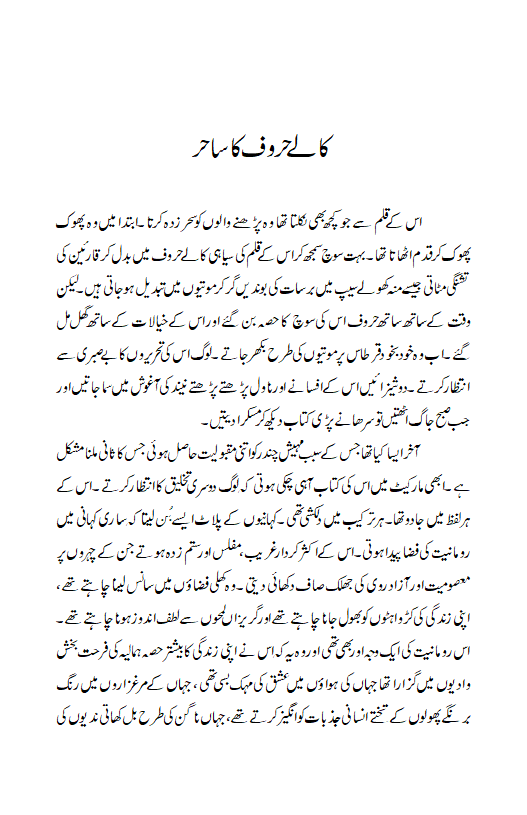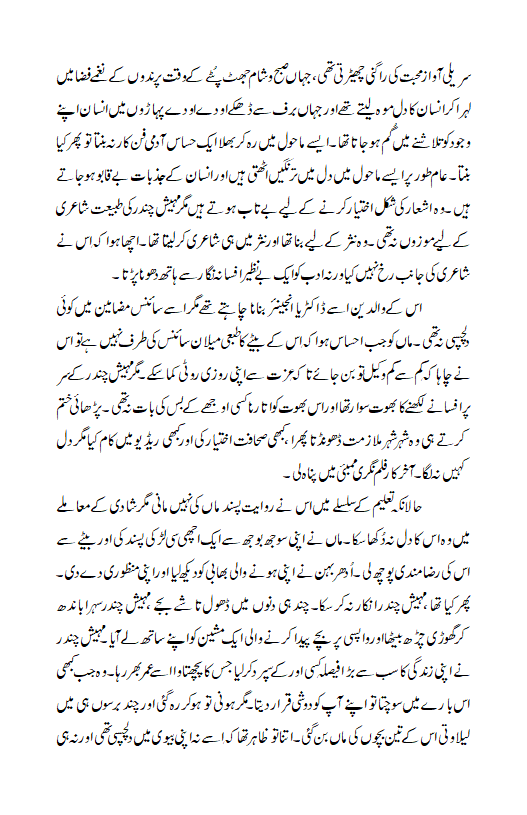"Deepak Budki's stories serve as a comprehensive reflection
of fifty years, capturing the diverse changes in life and the
social, cultural, and environmental events that have transpired
during this time. His work adeptly portrays these transformations
through various creative means, making this ability a prominent
aspect of his storytelling."
(Dr Reyaz Tawheedi)
Deepak Budki, born on February 15, 1950, in Srinagar, Kashmir, stands as a distinguished figure in contemporary Urdu literature and a notable career in the Indian Postal Service. His life and work reflect an impressive blend of literary artistry, public service, and academic scholarship, showcasing his deep commitment to both literature and societal development.
Deepak Budki's academic journey is marked by a rigorous pursuit of knowledge. He earned an M.Sc. in Botany and a B.Ed. from Kashmir University, an Adib-e-Mahir from Jamia Urdu Aligarh, and is a graduate of the National Defence College, New Delhi. His scholarly dissertation on "Genesis of Kashmir Problem and Article 370," submitted to the National Defence College in 1992, underscores his engagement with critical socio-political issues.
His professional career, spanning over four decades, began with the J&K Handicrafts (S&E) Corporation, where he managed the Kashmir Government Arts Emporium and later served as a Statistical & Review Officer. His tenure with the Indian Postal Service commenced in 1976, including a notable nine-year stint with the Army Postal Service as Lt. Colonel. Deepak Budki retired on February 28, 2010, as Member (Planning) of the Postal Services Board, New Delhi. During his tenure as Director PLI his greatest contribution was to extend Postal Life Insurance to rural areas in India۔ His role in J&K was characterized by resilience, particularly during periods of intense conflict, where he managed the rehabilitation of migrant staff, pension arrangements, and account transfers amidst challenging conditions besides maintaining the Postal Services during the turbulent times۔
His literary career is both prolific and diverse. His contributions encompass over 160 short stories and 10 research-based books published in India, Pakistan, and Europe. Notable collections of his short stories include:
Adhoore Chehre (1999, 2005, 2014; Hindi edition 2005), Chinar ke Panje (2005, 2014; Hindi edition 2010), Zebra Crossing Par Khada Aadmi (2007, 2018), Reza Reza Hayat (2010), Ruh Ka Karb (2015), Muthi Bhar Rait (2015), Ab Main Wahan Nahi Rehta (2017), Jadon Ki Talash (2019), Yeh Kaisa Rishta (2022), Patton Par Likhi Tehreerein (2023).
His novels, Apna Apna Such (2022) and Azadi (2022), and his critical essays and research-based books, such as Urdu Ke Ghair Muslim Afsana Nigar (2017, 2020), a research-based book in which the lives and literary contributions of non-Muslim fiction writers are beautifully and thoroughly highlighted, Krishan Chander-Meri Nazar Mein (2022), further enrich Urdu literature.
The English translation of the story 'Zebra Crossing Par Khada Aadmi' has been featured in the anthology 'The Pigeons of the Domes', curated by Rakshanda Jalil. This story, along with others, has been translated into various languages. For instance, 'Ghonsla' was translated into Kashmiri and published in the January-March 2012 issue of Wakh, while its English version, 'The Nest', was brought out by Shahul Taph in New Delhi in 2018. Moreover, 'Mukhbir' (The Informer) has been translated and published in Kashmir Central Weekly in Jammu, as well as on online platforms like KNN Online, Shehjar Online, and KAW Online. The Telugu translation of 'Zebra Crossing Par Khada Aadmi,' titled 'Zebra Crossing Dagara O Kamani', was released on the Emana Web Zone on January 1, 2013, and the English translation appeared in Journalism Today in Cuttack, Odisha, from October to December 2013.
His short stories have garnered exceptional acclaim from eminent literary figures like Shamsur Rahman Farooqi, renowned for his critical acumen, alongside Waris Alvi, Sultana Meher, and Anwar Sadeed, have all offered glowing reviews. Their praise underscores the profound narrative depth and innovative approach of his work, highlighting its significant contribution to modern literature۔
Sultana Mehar a well-known writer, poet and journalist, comments that "while the literary world was once dominated by symbolic fiction; sometimes sacrificing narrative clarity, Deepak Budki offers a refreshing change. His stories are firmly rooted in the authentic experiences of his own society, rather than relying on external themes. In works such as Chinar ke Panje and Adhoore Chehre, Budki skillfully blends subtlety with stark realities, crafting engaging narratives that deeply resonate with readers through their nuanced exploration of relationships and social issues." (Translated from Urdu)
Noor Shah, a veteran fiction writer and literary luminary, commends Deepak Budki as a distinguished and internationally acclaimed short story writer. Budki’s work captures India's rich social and cultural landscape, further enriched by his extensive government experience. His collections like Adhoore Chehre, Chinar ke Panje, and Zebra Crossing Par Khada Aadmi demonstrate his expert use of symbolism and a nuanced exploration of human experiences. Budki’s innovative narrative style and profound insights firmly establish him as a prominent figure in contemporary literature.
Renowned Urdu fiction writer and critic Dr Reyaz Tawheedi Kashmiri offers high praise for Deepak Budki's storytelling, highlighting its profound ability to capture and reflect the socio-cultural and political changes of the past fifty years. Dr Reyaz Tawheedi particularly commends Budki’s exploration of the migration and experiences of Kashmiri Pandits.
"In works such as Zebra Crossing Par Khada Aadmi, Budki’s portrayal stands out for its emotional depth and authenticity. He presents the trials of migration with remarkable realism, steering clear of embellishment. His adept handling of intricate themes, coupled with his sophisticated and nuanced narrative techniques, reveals a masterful approach to storytelling. Budki’s work is marked by a genuine engagement with his subjects, creating a vivid and compelling portrayal of human experience and societal evolution."
His work has been translated into multiple languages, including English, Hindi, Kashmiri, Pahari (Gojri), Marathi, Telugu, and Bengali. His stories have appeared in various anthologies, showcasing their broad appeal and impact.
Beyond his notable literary achievements, Deepak Budki has made a considerable impact as a cartoonist, contributing to newspapers such as Jahan-e-Nav, Navjeewan, Hamara Kashmir, and Uqab. His editorial role as Joint Editor at Uqab Weekly and his participation in debates and quiz programs on All India Radio and Doordarshan further showcase his diverse talents.
Budki has been actively involved in academic discourse, presenting at seminars and conferences including the three-day event on "Baresaghir mein Urdu Zabaan wa Adab" at Kashmir University, the two-day seminar on the "Secular Character of Urdu Language" at Jammu University, and the Tawi Kinare-The Jammu Lit Fest.
His contributions have been recognized through several prestigious awards such as the Postal Life Insurance Gold Medal in 1979, the Rashtriya Gaurav Samman, and the 5th Dr Manzar Kazmi National Award for Fiction in 2019. He has also received honours from the Andhra Urdu Academy and Sadbhavna Manch, Sironj.
Budki’s work has been featured in various special supplements and scholarly journals, and his life and contributions have been the subject of academic dissertations and research, highlighting his significant role in Urdu literature.
In addition to his professional and literary pursuits, Budki is an avid artist with interests in drawing, painting, cartooning, and gardening. His travels to international destinations such as Bangkok, Dubai, Rome, Cairo, and Paris have broadened his cultural perspectives.
Deepak Kumar Budki’s multifaceted career exemplifies a deep commitment to both public service and the arts. His extensive contributions in administrative roles, literary fields, and academic research underscore his prominence in Urdu literature and the Indian Postal Service, marking him as a distinguished figure whose legacy continues to inspire and influence.
*****
(Dr Basharat Khan is a writer, columnist, critic and author of the book "Literary Beats". He can be reached at chogalwriter76@gmail.com/Devnalwhispers.in Mob:7006616946)









.gif195.gif)
.gif196.gif)
.gif197.gif)
.gif198.gif)
.gif199.gif)
.gif200.gif)










